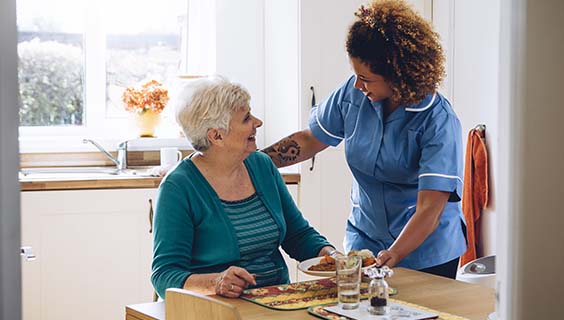As people age, it’s important to plan for end-of-life care to ensure their wishes are respected and their families are prepared for the eventual loss. End-of-life care involves a range of medical, emotional, and practical considerations that can be challenging for older adults and their families. End-of-Life Care for Older Adults and Their Families
However, addressing these needs is critical to ensuring that individuals receive the care they desire and that families have the support they need during a difficult times. This article will discuss strategies for addressing end-of-life care needs for older adults and their families.
It’s essential to recognize the challenges that may arise in end-of-life care, including the emotional impact on families, the difficulty in making decisions about medical treatments, and the financial implications of care. By understanding these challenges, individuals and families can better prepare for the end-of-life process.
Advance Care Planning
Advance care planning is crucial in addressing end-of-life care needs for older adults. It involves discussing an individual’s values and medical care preferences if they cannot communicate their wishes. These discussions help ensure that an individual’s wishes are respected and that their loved ones are not burdened with making difficult decisions on their behalf.
One important component of advanced care planning is the creation of a living will. A living will is a document that outlines an individual’s wishes for medical care if they cannot communicate their wishes themselves. This document can help guide healthcare decisions and ensure an individual’s wishes are respected.
Another important component of advance care planning is the appointment of a healthcare proxy, also known as a durable power of attorney for healthcare. This individual is designated to make healthcare decisions on an individual’s behalf if they cannot do so themselves. Choosing someone who understands the individual’s values and preferences and can make difficult decisions is important.
Initiating advance care planning discussions with older adults and their families can be challenging, but some tips can make it easier. It is important to approach the conversation with sensitivity and to emphasize that the goal is to ensure that the individual’s wishes are respected. It can also be helpful to start the conversation early and revisit the topic periodically to ensure that the individual’s wishes are current.
Palliative Care
Palliative care is an important aspect of end-of-life care for older adults with serious illnesses. It is a specialized form of medical care that focuses on improving the quality of life for patients and their families facing serious illnesses. Palliative care can help manage symptoms and side effects, provide emotional support, and help patients and their families navigate difficult decisions.
There are different types of palliative care, including hospice and home-based palliative care. Hospice care is typically provided to patients with a life expectancy of six months or less who have chosen to stop curative treatments. Hospice care can be provided in a dedicated facility or at home, focusing on providing comfort care and improving quality of life. On the other hand, home-based palliative care is provided in the patient’s home and is designed to help patients manage their symptoms and maintain their independence.
Palliative care can benefit older adults with serious illnesses and their families. It can help manage pain and other symptoms, provide emotional and spiritual support, and help patients and their families navigate difficult decisions. Additionally, studies have shown that palliative care can improve quality of life, reduce hospitalizations, and even prolong life in some cases.
Older adults and their families must discuss palliative care options with their healthcare providers to ensure they receive the best possible care at the end of life.
Communication and Support
As the end of life approaches, communication and support become increasingly important for older adults and their families. Effective communication ensures that the individual’s wishes are respected, and their physical, emotional, and spiritual needs are addressed. On the other hand, support can help reduce feelings of isolation, anxiety, and depression that may arise during this time. End-of-Life Care for Older Adults and Their Families
To facilitate effective communication and support, healthcare providers and caregivers can take steps such as active listening, expressing empathy, and creating a safe and comfortable environment for the individual and their family. They can also help to facilitate difficult conversations about end-of-life care wishes and help families to navigate the decision-making process.
It is also important for healthcare providers and caregivers to recognize and address their emotional needs during this time. Providing end-of-life care can be emotionally taxing, and seeking support from peers, supervisors, or professional counselors can help to prevent burnout and ensure that high-quality care is provided.
Grief and Bereavement Support
Grief and bereavement are normal processes individuals go through after losing a loved one. However, it can be especially difficult for older adults, who may have experienced multiple losses throughout their lifetime. Addressing grief and bereavement needs is important to promote healthy coping and adjustment to life after loss.
In this section, we will discuss the impact of grief and bereavement on older adults and their families. We will also explore different grief and bereavement support types and provide resources for accessing these services.
The impact of grief and bereavement on older adults can vary from person to person. Some may experience feelings of sadness, guilt, anger, or loneliness. Others may experience physical symptoms such as fatigue or trouble sleeping. Older adults who have experienced multiple losses, such as losing a spouse and close friends, may be more susceptible to grief and bereavement.
Grief and bereavement support can come in many forms, including counseling, support groups, and online resources. Counselors can provide a safe space for individuals to express their emotions and work through the grieving process. Support groups offer a sense of community and understanding for individuals who have experienced a similar loss. Online resources can provide information and guidance for those needing access to in-person support.
Healthcare providers and caregivers need to recognize the impact of grief and bereavement on older adults and their families. By providing access to grief and bereavement support services, individuals can receive the care and support they need to navigate the grieving process and move forward with their lives.



Recent Comments